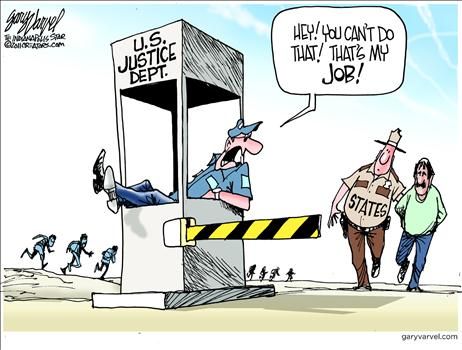Dfit00
War Child
The wave of new legislation followed the lead of Arizona Senate Bill 1070, which Gov. Jan Brewer signed into law in April 2010. Legislatures in Utah, Indiana and Georgia passed bills that featured many of the same sanctions against illegal immigrants as Arizona.
But the most restrictive law came from Alabama. Gov. Robert Bentley called it “the strongest immigration law in the country,” and few would dispute the assertion.
Shortly after Gov. Bentley signed the bill into law, three separate lawsuits targeted it as unconstitutional. The Obama administration filed suit, claiming Alabama had usurped powers that rightfully belong to the federal government.
Until recent years, states had accepted with little question that the responsibility for immigration policy and border security belonged exclusively with the federal government. That changed after 2000, when the number of illegal immigrants in the United States reached an estimated 12 million.
Critics of the Alabama law called it “Arizona on steroids” because of its stringent and far-reaching measures. The law would:
Make it a crime for an illegal immigrant to solicit work.
Make it a crime to knowingly transport or harbor an illegal immigrant.
Allow individuals, companies or government entities to file discrimination lawsuits against companies that dismiss legal workers while hiring illegal immigrants.
Require public schools to check the immigration status of students.
Allows authorities to hold suspected illegal immigrants without bond.
Ban state courts from enforcing contracts involving illegal immigrants.
Make it a felony for an illegal immigrant to get drivers licenses or do business with the state.
Make it a misdemeanor offense for an illegal immigrant not to have immigration papers.
Ban illegal immigrants from attending public colleges and junior colleges.
Prohibit businesses from claiming tax deductions for wages paid to illegal immigrant employees.
Require federal verification of legal status in court proceedings.
Make it illegal for motorists to stop on streets or roads to hire temporary workers.
Supporters of the law hope it will create an intimidating climate for illegal immigrants and drive them from the state. The Republican lawmakers who sponsored the bill believe that as more illegal immigrants “self-deport” themselves from Alabama, more jobs will open up for U.S. citizens.
Alabama Immigration Law Cracks Down
http://www.nytimes.com/2011/09/29/u...held.html?scp=1&sq=Alabama immigration&st=cse

 I looooove this clip. DEY TOOK ERRR JERRR
I looooove this clip. DEY TOOK ERRR JERRR
